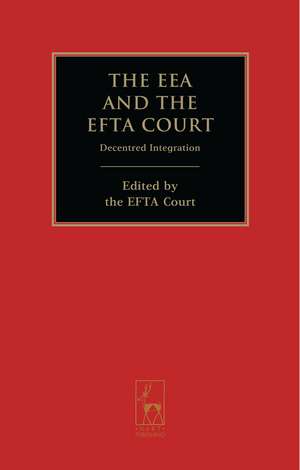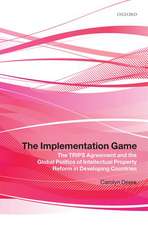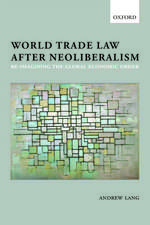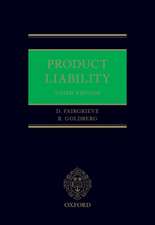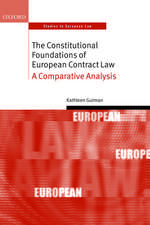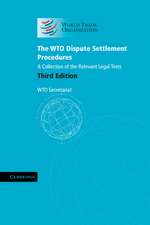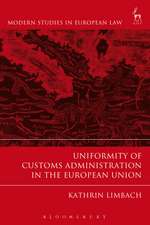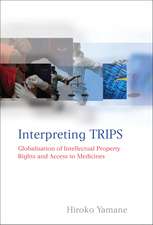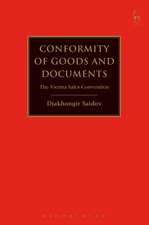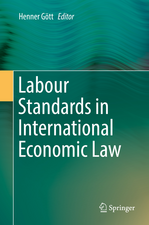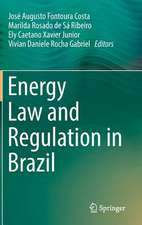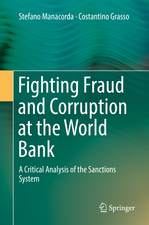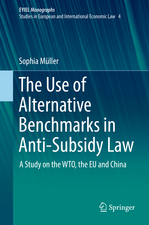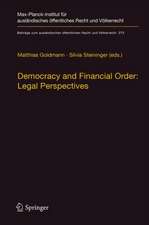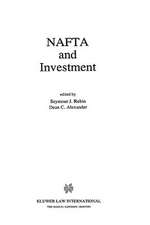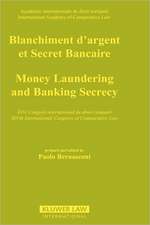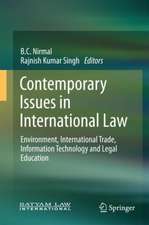The EEA and the EFTA Court: Decentred Integration
Editat de EFTA Courten Limba Engleză Hardback – 28 ian 2015
Preț: 782.53 lei
Preț vechi: 1118.06 lei
-30% Nou
Puncte Express: 1174
Preț estimativ în valută:
149.76€ • 155.77$ • 123.63£
149.76€ • 155.77$ • 123.63£
Carte tipărită la comandă
Livrare economică 15-29 aprilie
Preluare comenzi: 021 569.72.76
Specificații
ISBN-13: 9781849466264
ISBN-10: 1849466262
Pagini: 596
Dimensiuni: 156 x 234 x 12 mm
Greutate: 1.01 kg
Editura: Bloomsbury Publishing
Colecția Hart Publishing
Locul publicării:London, United Kingdom
ISBN-10: 1849466262
Pagini: 596
Dimensiuni: 156 x 234 x 12 mm
Greutate: 1.01 kg
Editura: Bloomsbury Publishing
Colecția Hart Publishing
Locul publicării:London, United Kingdom
Caracteristici
This book reviews the successes and shortcomings of the EFTA Court, its interface with EU law, and the prospects for its future development.
Notă biografică
Edited by Members of the EFTA Court
Cuprins
I. Introduction 2. The EFTA Court's Early Days 3. The Style of the EFTA Court 4. European Courts in Dialogue 5. The Advocates General and the EFTA Court 6. The Immoral Choice-How Judges Participate in the Transformation of Rule of Law to Legal Evil 7. The Content of Requests for Preliminary Rulings to the European Court of Justice and the EFTA Court-What are the Minimum Requirements? 8. Practical Issues Regarding the Application of EEA Law through the Eyes of a National Judge 9. 'To Refer or Not to Refer?' 10. 'To Refer or Not to Refer?' Confession of a National Judge 11. Efficient Judicial Protection of EEA Rights in the EFTA Pillar-Different Role for the National Judge? 12. The Norwegian Experience of the EEA Judiciary 13. The Role of Individual Lawyers in EEA Law 14. Reciprocity, Homogeneity and Loyal Cooperation: Dealing with Recalcitrant National Courts? 15. Preliminary Rulings in the EEA-Bridging (Institutional) Homogeneity and Procedural Autonomy by Exchange of Information 16. European Integration 17. Free Movement of People and the European Economic Area 18. 'Shall be Made Part of the Internal Legal Order': The Legislative Approaches 19. Climate Change Law and Policy in the EEA-A View from the General Court 20. Homogeneity or Renationalisation in the European Judicial Area? Comments on a Recent Judgment of the Norwegian Supreme Court 21. General Principles 22. Fundamental Rights in EEA Law 23. Uncharted Waters: Reflections on the Legal Significance of the Charter under EEA Law and Judicial Cross-Fertilisation in the Field of Fundamental Rights 24. The Essentials 25. Judicial Protection in the EEA EFTA States-Direct Effect of EEA Law Revisited 26. The EFTA Court and the Principle of State Liability: Protecting the Jewel in the Crown 27. Fine-tuning Transparency 28. The Free Movement of Goods in EEA Law: The Philip Morris Norway, Commission v Italy and Mickelsson and Roos Cases 29. The EFTA Court-A Court of Business Law? 30. Icesave-Limited Homogeneity and Unlimited Judicial Interpretation 31. Standard of Review in Competition Law Cases: Posten Norge and Beyond 32. Third Party Access to File in Competition Cases 33. To Tax or Not to Tax: Reflections on the Case Law of the EFTA Court 34. The EEA Joint Committee-A Political Assessment 35. The EEA Surveillance Mechanism 36. The EFTA Surveillance Authority and the Surveillance of the EEA Agreement 37. The EFTA Secretariat: Steward of the EEA 38. EEA Law, Unexpected Success: A Japanese Perspective 39. EU Law, EEA Law and International Law-The Myth of Supranational Law and Its Implications forInternational Law 40. A Look at the EEA from Switzerland
Descriere
The essays in this collection, written by members of the EFTA Court and external experts, review the successes and shortcomings of the EFTA Court, its interface with EU law, and the prospects for its future development.
